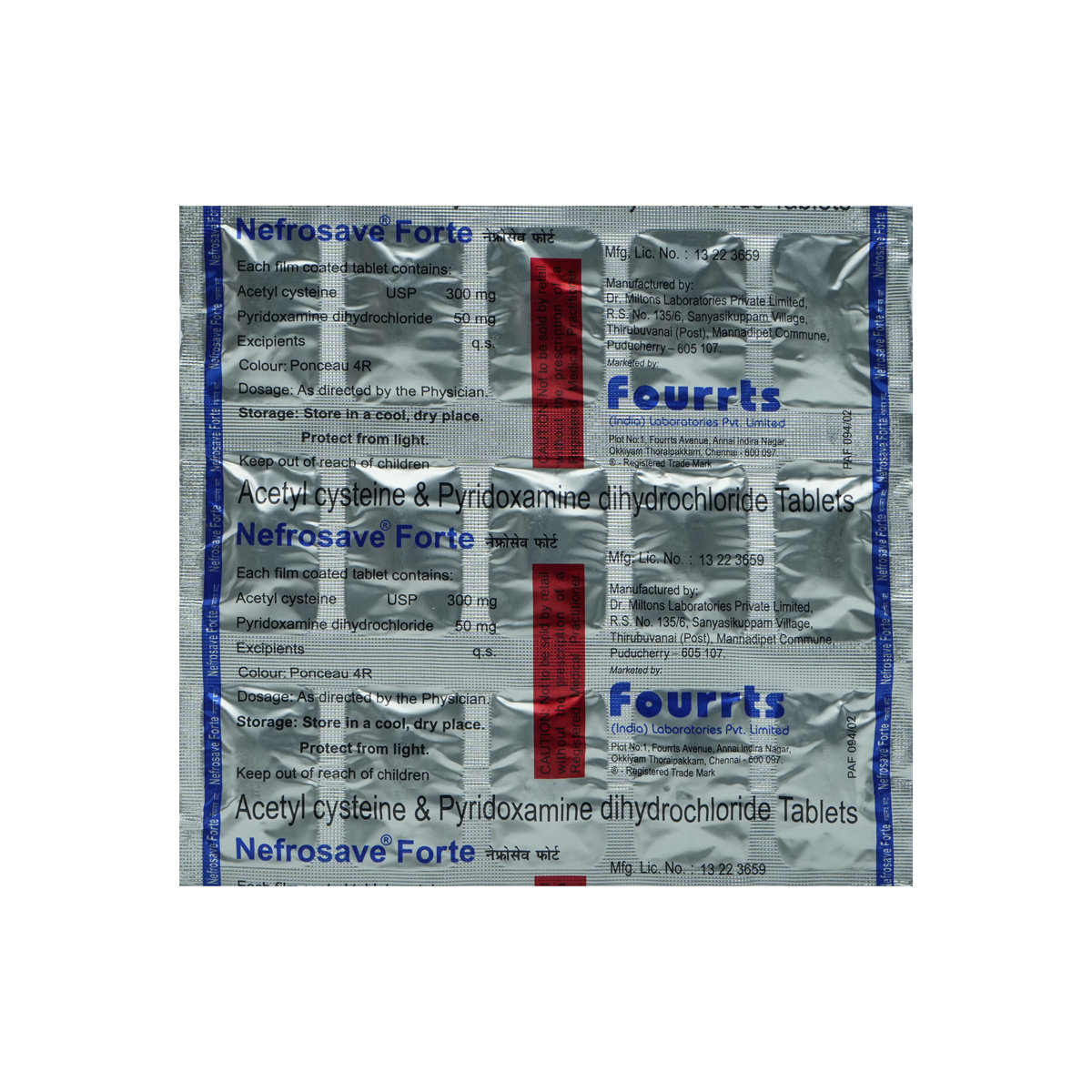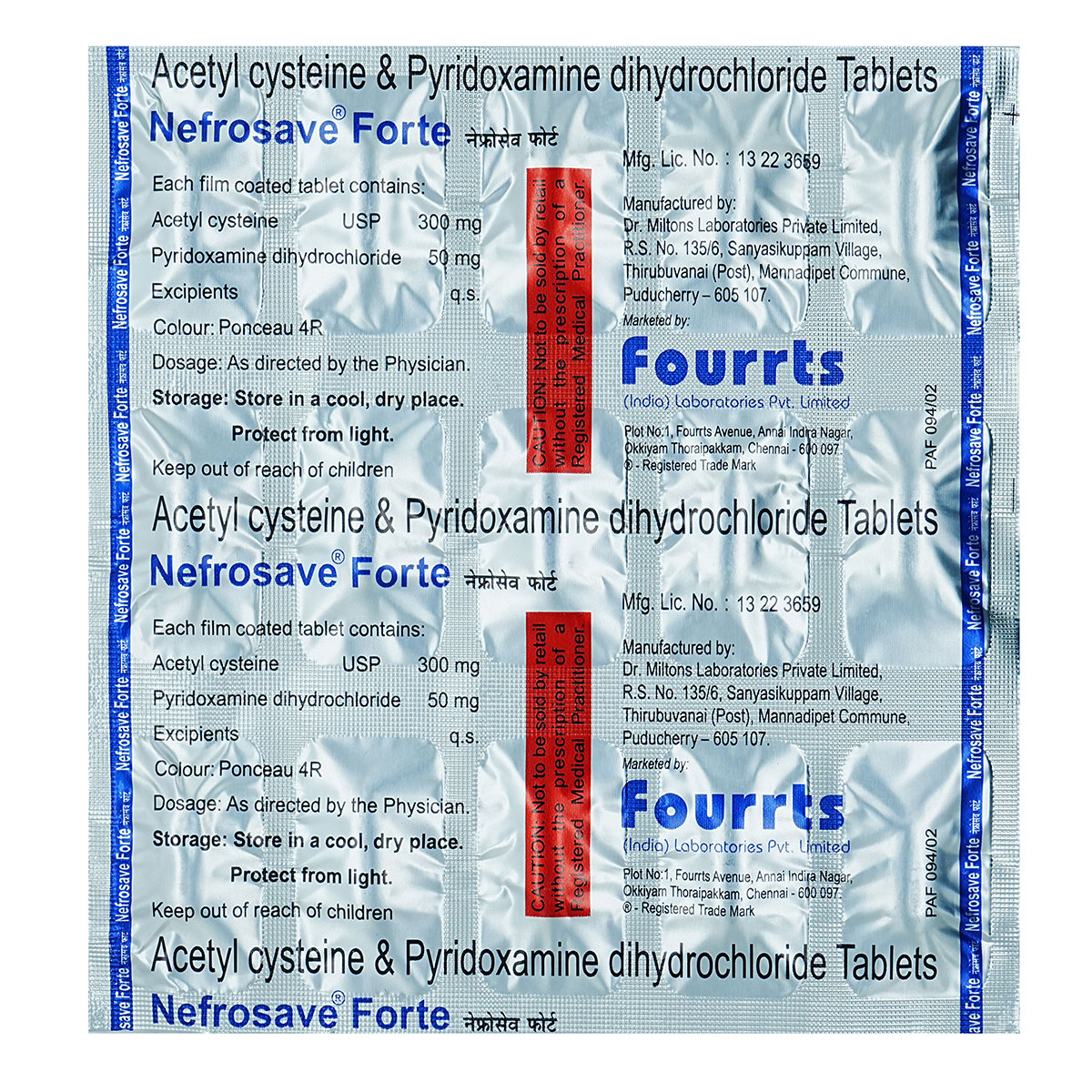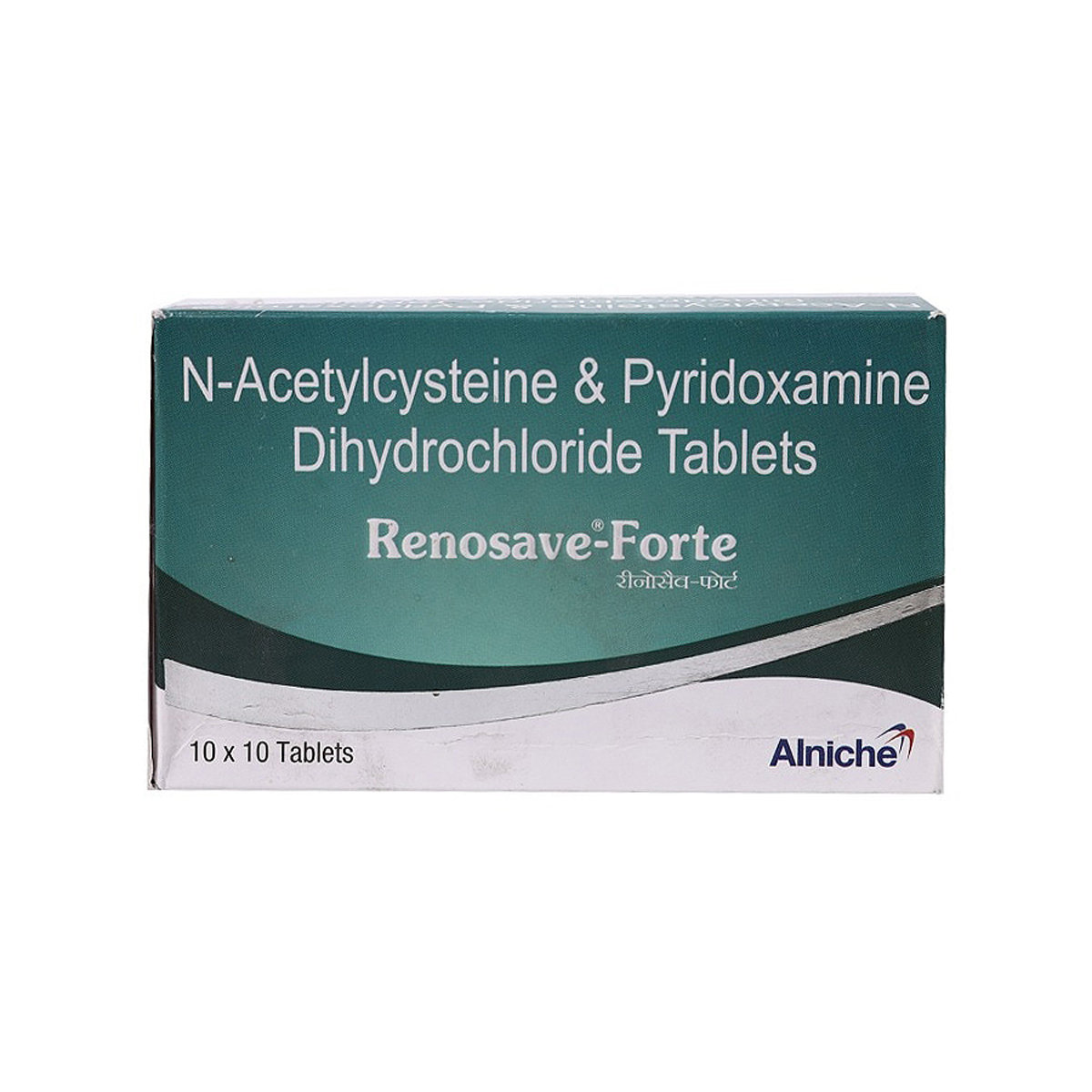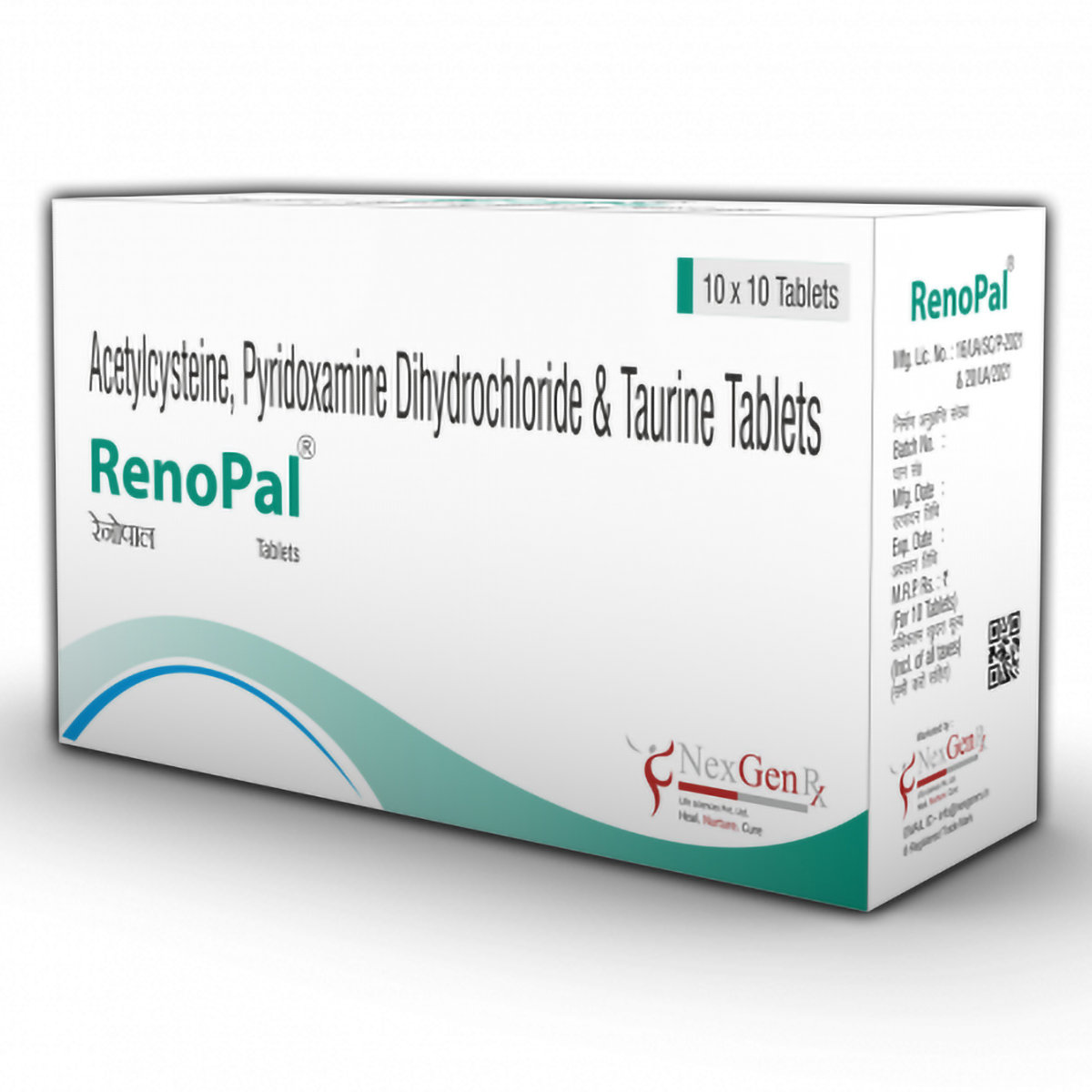Acetylcysteine+pyridoxamine Dihydrochloride
About Acetylcysteine+pyridoxamine Dihydrochloride
Acetylcysteine+pyridoxamine Dihydrochloride is used to treat chronic kidney disease (CKD). Chronic kidney disease is characterised by a progressive loss of kidney function over time. Kidneys remove waste and excess fluid from the blood. Waste can accumulate to dangerously high levels in the blood due to kidney disease, making you sick.
Acetylcysteine+pyridoxamine Dihydrochloride contains Pyridoxamine dihydrochloride and Acetylcysteine. Acetylcysteine acts as an antioxidant and protects body tissues in people with chronic kidney disease and those on dialysis. Pyridoxamine dihydrochloride acts as a catalyst in the metabolism of fats, carbohydrates, and proteins in the body, thereby assisting in maintaining energy balance in kidney disease patients. As a result, Acetylcysteine+pyridoxamine Dihydrochloride aids in treating chronic kidney disease.
To treat your condition effectually, continue using Acetylcysteine+pyridoxamine Dihydrochloride for as long as your doctor has prescribed it. Acetylcysteine+pyridoxamine Dihydrochloride may cause nausea, vomiting, diarrhoea, and abdominal pain in some cases. The majority of these side effects do not necessitate medical attention and will resolve gradually over time. If you are experiencing these side effects regularly, consult your doctor.
Please do not take Acetylcysteine+pyridoxamine Dihydrochloride if you are allergic to Pyridoxamine dihydrochloride, Acetylcysteine or any of its ingredients. Consult your doctor before using Acetylcysteine+pyridoxamine Dihydrochloride if you are pregnant or breastfeeding. Limited information is available regarding the usage of Acetylcysteine+pyridoxamine Dihydrochloride in children, so please consult a doctor if you have any concerns. Keep your doctor informed about your health condition and all the medicines you take to rule out any side effects.
Uses of Acetylcysteine+pyridoxamine Dihydrochloride
Medicinal Benefits
Acetylcysteine+pyridoxamine Dihydrochloride is used to treat chronic kidney disease. Acetylcysteine+pyridoxamine Dihydrochloride contains Pyridoxamine dihydrochloride (vitamin B6 derivative) and Acetylcysteine (antioxidant), which helps in various ways to prevent kidney damage or injury. Thereby it effectively improves kidney function, reducing complications in patients with chronic kidney disease.
Directions for Use
Storage
Side Effects of Acetylcysteine+pyridoxamine Dihydrochloride
- Nausea
- Vomiting
- Diarrhoea
- Abdominal pain
Drug Warnings
To effectively treat your disease, continue using Acetylcysteine+pyridoxamine Dihydrochloride for as long as your doctor has prescribed it. If you have had a skin response or irritation to any medicine, do not use Acetylcysteine+pyridoxamine Dihydrochloride without consulting a doctor. Consult your doctor before using Acetylcysteine+pyridoxamine Dihydrochloride if you are pregnant or breastfeeding. Before taking Acetylcysteine+pyridoxamine Dihydrochloride, inform your doctor about your medical history and other medications you are currently taking to rule out any potential negative effects. It is unknown whether consuming alcohol with Acetylcysteine+pyridoxamine Dihydrochloride is safe. However, it is best to avoid or limit alcohol consumption as a precaution.
Drug Interactions
Drug-drug interactions: Acetylcysteine+pyridoxamine Dihydrochloride may interact with a medication used to treat Parkinson’s disease (e.g. levodopa), a medication used to treat tuberculosis (e.g. isoniazid), a medicine used to treat poisonings (e.g. activated charcoal), a medication used to treat arthritis (e.g. penicillamine), aminoglycoside antibiotics (e.g. gentamicin, streptomycin, tobramycin, and amikacin), other antibiotics (e.g. penicillin and tetracycline), and medicine used to treat chest pain (e.g. glyceryl trinitrate).
Drug-food interactions: Limit the intake of potassium or phosphate in your diet.
Drug-disease interactions: Acetylcysteine+pyridoxamine Dihydrochloride should be used with caution in patients with asthma, stomach ulcers, liver disease, serious skin rashes, and allergy.
Drug-Drug Interactions Checker List:
Safety Advice

Alcohol
cautionIt is not known if alcohol interacts with Acetylcysteine+pyridoxamine Dihydrochloride. However, it is advisable not to take or limit alcohol as a precautionary measure.

Pregnancy
cautionPlease consult the doctor. There are no adequate and well-controlled studies on pregnant women. Your doctor will prescribe only if the benefits outweigh the risks.

Breast Feeding
cautionConsult your doctor as there is no substantial research yet on the use of Acetylcysteine+pyridoxamine Dihydrochloride in breastfeeding/nursing mothers.

Driving
safe if prescribedAcetylcysteine+pyridoxamine Dihydrochloride may not affect your ability to drive or use machinery.

Liver
cautionLimited information was available about the use of Acetylcysteine+pyridoxamine Dihydrochloride in patients suffering from liver impairment. Please consult your doctor if you have any concerns. Your doctor will prescribe only if the benefits outweigh the risks.

Kidney
safe if prescribedAcetylcysteine+pyridoxamine Dihydrochloride can be taken safely when prescribed. Usually, it does not affect the kidney.

Children
cautionLimited information is available regarding the usage of Acetylcysteine+pyridoxamine Dihydrochloride in children, so please consult a doctor if you have any concerns.
Habit Forming
Diet & Lifestyle Advise
- A healthy, balanced diet lowers your risk of kidney disease. Keep your blood pressure and cholesterol at a healthy level.
- A well-balanced diet should include plenty of fruits and vegetables.
- Include starchy foods such as potatoes, wholegrain bread, rice, or pasta in your main meal.
- For a protein source, include beans or pulses, fish, eggs, or meat in your daily diet.
- Limit intake of saturated fat, salt, and sugar.
- Limit the amount of potassium or phosphate in your diet.
- Quit smoking. Avoid or limit the consumption of alcohol.
Patients Concern
Disease/Condition Glossary
Chronic kidney disease: Chronic kidney disease, also known as chronic kidney failure, is a long-term kidney condition that results in renal failure. Kidneys remove waste and extra fluid from the blood. Renal disease is characterised by a steady decline of kidney function over time. As a result, waste can accumulate to dangerously high levels in the blood, potentially making you sick. Loss of appetite, nausea, vomiting, sleep problems, swelling of the feet and ankles are the symptoms of renal failure. Treatment focuses mostly on stopping the progression of kidney disease by addressing the underlying cause.
FAQs
Acetylcysteine+pyridoxamine Dihydrochloride contains Pyridoxamine dihydrochloride and Acetylcysteine, which help prevent kidney damage or injury in various ways. As a result, it improves kidney function and reduces complications in patients with chronic kidney disease.
To treat your condition effectually, continue taking Acetylcysteine+pyridoxamine Dihydrochloride for as long as your doctor has prescribed. Please do not stop taking Acetylcysteine+pyridoxamine Dihydrochloride without consulting your doctor.
CKD is typically caused by illnesses such as high blood pressure, diabetes, high cholesterol, kidney infections, renal inflammation, recurring kidney stones, an enlarged prostate, and long-term, regular use of certain medications such as lithium and nonsteroidal anti-inflammatory drugs (NSAIDs).
You cannot always avoid chronic kidney disease (CKD), but you can reduce your chances of developing it by managing underlying conditions like diabetes or high blood pressure.
Chronic kidney disease can be caused by taking too many non-steroidal anti-inflammatory medications or taking them for longer than recommended.
Smoking raises your risk of cardiovascular illness, such as heart attacks or strokes, which is linked to an increased risk of chronic kidney disease (CKD).
It is recommended that you minimise the intake of potassium and phosphate-rich foods.
Blood and urine tests can be used to detect chronic kidney disease (CKD). Other tests may be used to determine the extent of kidney injury. These may include an ultrasound, MRI, or CT scan, as well as a kidney biopsy.






